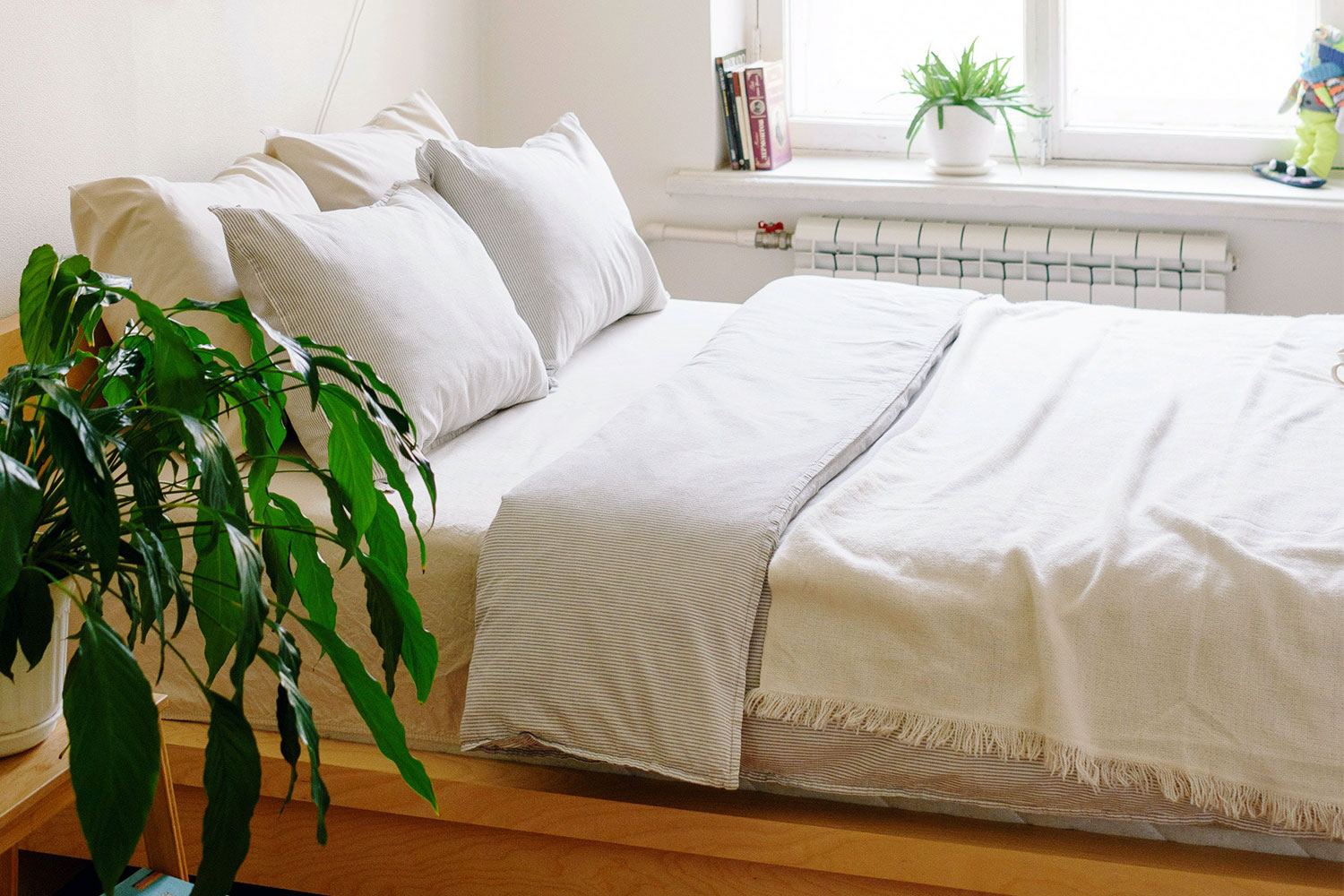Good Sleep Hygiene Is a Foundation of Conscious Living—and Sustainable Sleep Is on the Rise
Getting a good night's sleep is an important part of being a mindful person. From sunrise alarms to green noise, these sustainable sleep trends are on the rise.

Published
Human beings are complicated. Our need for sleep is simple. Sleep is a fundamental aspect of animal life on this planet, which makes “sustainable sleep” something of a repetitive phrase. Nevertheless, an influx of environmentally-minded shifts is here to bring your rest routine a touch closer to nature—and help you live more sustainably, in turn.
“Practicing proper sleep hygiene and getting enough quality sleep is essential for basic functioning and has a tremendous impact on your mood, productivity, and overall health,” says Shelby Harris, PsyD, director of sleep health at Sleepopolis, who notes that better sleep leads to improved mood, emotional processing, memory, decision-making skills, productivity, better health, and better relationships. “It’s important to try and get seven to nine hours of sleep routinely to adopt and maintain a healthy, mindful lifestyle.”
What Does Sleep Have to Do With Sustainability?

It’s this aforementioned mindfulness—the act of curious, non-judgemental attention—that makes sleep such an important part of showing up properly for the planet. Increased mindfulness allows us extra awareness of our daily habits, an enhanced appreciation of nature, and recognition of our connection to others as well as the Earth.

Naturepedic EOS Classic Organic Mattress
Save 15% sitewide at Naturepedic.com by using the code BRIGHTLY15 at checkout.
“A great step toward living a more mindful lifestyle is getting enough sleep every night,” says Dr. Harris. “When busy or overwhelmed, sleep can be one of the first things people neglect.” And when we neglect our own health and wellness, it becomes all too easy to neglect the environment, too.
In short, getting a good night’s sleep is a major focus of 2023. But while trends like sleep tourism are all about a solid slumber, they’re not necessarily good for the planet. Here, three sleep trends designed to make your slumber a more conscious one.
3 Sustainable Sleep Trends in 2023

1. Sustainable Setups
How you sleep depends largely on what you’re sleeping on—like Naturepedic’s EOS Classic Customizable Organic Mattress. Naturepedic centers sustainability by eschewing toxic or questionable chemicals, prioritizing natural materials over synthetics, and supporting a multitude of in-step initiatives including 1% for the Planet, meaning that 1% of Naturepedic’s annual mattress sales are donated to environmental causes.
“Sustainable living, including sleeping on sustainable mattresses, will substantially decrease the toxic chemicals that most people are exposed to every single day,” says Naturepedic founder and technical director Barry Cik. “And that translates into better rest."
2. Nature-Inspired Noise
For those who wind down with the help of a well-selected external sound, green noise is the ideal Earth-inspired addition to an evening routine. Green noise is a type of white noise that centers natural sounds at a low frequency (500 Hertz) to achieve a soothing effect.
“Green noise is commonly associated with sounds from nature such as waterfalls, oceans, and rain,” says Dr. Harris. “Some people find that listening to green noise helps them relax and unwind before bed, while also masking any outside noises that might disrupt their sleep.” As with the sounds of nature, green noise often includes inconsistencies—something for ultra-light sleepers to consider.
3. Sunrise Alarms
Sunrise alarm clocks are crafted to mimic the sun’s daily appearance over the horizon line and are ideal for those who have to wake up before the real star starts to shine.
“The circadian rhythm, our body's internal clock that tells us what time to go to bed and when to wake, is regulated by the natural sunlight,” says Dr. Harris. “Getting light exposure first thing in the morning can help someone feel more awake and energized throughout the day.”

Meet Green Noise: The Nature-Inspired Sleep Aid Psychologists Swear By
Green noise is here to help you sleep a bit more soundly—all while celebrating Mother Nature.

Can’t Sleep? Recent Study Reveals Climate Change Can Lead to Restless Nights
Researchers have discovered climate change and warmer temperatures are impacting human sleep patterns. That means more restless nights could be ahead.

5 Hemp Sheets to Try for a Sustainable Night's Sleep in 2023
Hemp is a sustainable alternative to other bedding options on the market. Here are the best hemp sheets to try in 2023.
